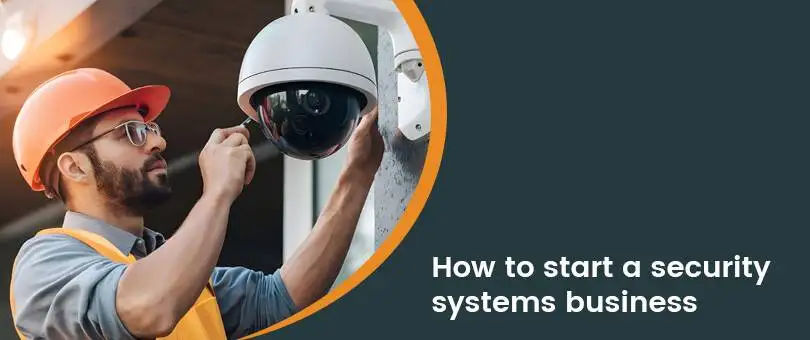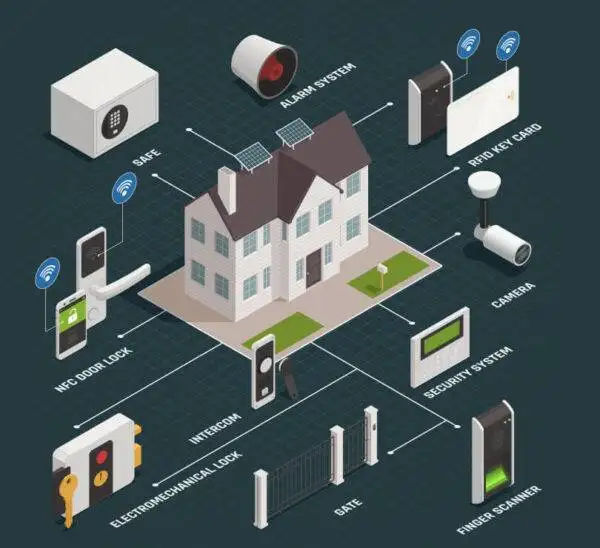How to start a security systems business

If anyone asks me what one business you can bet on that won’t see a decline soon, the security systems business would definitely be on my list.
Reason? Whether it’s about a corporate office, convenience store, or a bar—no place on earth doesn’t require basic security systems in place like CCTV cameras.
The home security market is hot right now, with experts predicting over 24.1% growth by 2026.
(You must be like: Well, well, that’s enough preaching about the potential, but how do I start)
Answer: this guide. Follow through with me till the end, you’ll know all you need to. Let’s jump into it.
1. Conduct a detailed research
Since you are going to sell and recommend security products and services, it’s important to conduct detailed research. Do your research and get answers to these key questions: What kinds of security systems are out there? What do they do? How do they work? But don’t stop at just knowing the products. You also need to know about your customers and competitors.
You can talk to your potential customers and know what they want. To know about your competition, you can see their websites and social channels to check what they’re offering.
And don’t forget to read industry reports to spot trends and opportunities.
2. Decide whether to go for franchise or start solo
When starting a security business, you have two choices. Either join a franchise or go solo. Franchises offer a ready-made blueprint with established branding and marketing. The trade-off? Less control. They often set your pricing and service offerings, which might not be ideal if you have a niche market in mind. Going solo gives you more freedom. You can set your own prices, choose your services, and target your ideal customers. But you’ll be starting from the bottom. This means finding products, doing marketing and searching clients on your own.
3. Research about the products
Since you’ll be selling security products, it’s crucial to know what you’re offering. Research different systems and choose high-quality, reliable ones with advanced features like false alarm prevention, video analytics, & cctv cloud storage. This will help you stand out from the competition.

When researching products, consider these questions
- What kinds of systems are manufacturers offering? Are there any unique features or technologies that set them apart?
- Where are the products made? Are they manufactured locally or imported?
- Do they offer warranties? A strong warranty means the manufacturer believes in their product.
If you’re into selling equipment like cameras or alarm systems, find a trusted supplier where you can buy in bulk. Price is important, but don’t go for cheap quality to save a few dollars. Because it can hurt your reputation and cause problems to your customers down the line.
Plus, research your manufacturers, too. Are they a well-known and trusted company? Have they been around for a while? Check online reviews to see what customers are saying about them.
4. Create a business plan
Next step: build a clear and concise business plan based on your research. A good business plan example will include key elements like market analysis, target customer identification, and a clear strategy for success.
Your plan should outline your path to success, including your budget, projected profits, and timeline. Clearly define your services and how you’ll attract customers.
Don’t forget to analyze your competitors. Understanding their pricing, branding, and marketing will help you stand out.
5. Make your business legal
Starting a security business comes with some legal hurdles. Many states require background checks, fingerprinting, and licenses to make sure you’re legit. Some also need a special insurance called a surety bond to protect customers if your company doesn’t deliver. It’s also wise to have general liability insurance and “errors and omissions” coverage. If you’re installing systems, you should have insurance for your vehicles, employees, and equipment. This will help you in case things go south. Plus, to run your security business legally, you need the right permits and licenses. Missing these could mean fines or even shutting down. Licensing rules are different in each state, so do your research. For example, in Indiana, you need a state license. They also have specific requirements, like having a related degree or experience. Next, choose a name that stands out from the crowd. It should be memorable and easy to find online.
6. Get necessary certifications
On top of that,
- Register your business
- Get a federal tax ID number
- Choose Business structure
If this feels confusing, consider hiring a lawyer. Alternatively, there are many business formation services such as ZenBusiness and Bizee (formely Incfile), you can partner with that offer free formation services and other helpful tools to simplify the process of setting up and running your business. They can handle the paperwork so you can focus on building your business.
To run a truly great security company, you need to show you’re the real deal. Alongside UL and ESA paths, a cloud security course signals competence with cloud DVRs, an IAM solution, and incident response for hosted video, making certification an important step. So, getting certified is important. One important certification is being “UL-listed,” which means you meet top safety standards. Plus, joining industry groups like the Electronic Security Association helps you build credibility and connect with other people in the field. Your local Chamber of Commerce is also a great way to network. And don’t forget about contracts. Solid contracts protect you and ensure you get paid fairly.
7. Learn specific skills
You probably already know a lot about security, but running a successful business takes more than just knowing the industry. You’ll need some basic business skills too. This includes things like managing people, handling money, and marketing your services. If you plan on hiring help, good communication and teamwork skills are a must. The security industry also has its own unique requirements. You might already know how to install and troubleshoot security systems. If not, you’ll need to learn or hire someone who can. It’s also important to understand the laws around security in your area. This includes things like knowing how to handle different situations, being aware of local crime rates, and understanding the laws about firearms. Plus, try to get a sense of how criminals operate in your area. This will help you recommend the best security solutions to your customers.
8. Hire employees
You’ll need to hire more employees as your business will grow. Remember, your employees reflect your company, so choose them carefully! Look for skilled technicians who can install and fix systems. Good communication skills are important too, since they’ll be interacting with customers. Customer service is also important. A helpful and friendly team can turn new customers into loyal ones. Make sure they have the training to handle questions and emergencies effectively. Furthermore, you can also consider using OMS systems as it will help your employees work more efficiently and simplify your processes.
9. Figure out funding
Starting a home security business? You’ll need some cash upfront. This could be a few thousand dollars to tens of thousands, depending on your plans. It is important to know where your money’s going: equipment, licenses, maybe an office. A detailed budget can help you over here. It can guide you to make smart choices and sets you up for success.
So, where do you get the money? You have a few options:
- Savings: Using your own money is great, but don’t risk it all. Keep some set aside for unexpected expenses.
- Friends and family: Taking loans from loved ones can be a good option. But, set clear agreements and be mindful of how it might affect your relationship.
- Loans: Banks and the Small Business Administration (SBA) gives business or personal loansspecifically for small businesses. An online personal loan calculator can be a useful tool to help you understand repayment terms. If you’re considering traditional loans, keep in mind that banks and the Small Business Administration (SBA) offer financing options specifically designed for small businesses. SBA loans can be particularly helpful for startups in the security industry due to their flexible terms and competitive rates. To explore your options or learn more about how to apply for an SBA loan, make sure to review updated resources about requirements and the application process—understanding these details can significantly improve your chances of getting approved.
10. Market your business
To kick off your home security business, spread the word! Tell everyone you know—friends, family, neighbors. People trust personal recommendations, especially for something as important as security. Networking is key, too. Connect with realtors, homeowner groups, and home builders. They often know people who need your services. Social media is your friend. Use it to get your name out there. Post helpful tips, customer reviews, or special offers to keep people interested. And of course, you need a website. A website makes your business look professional and credible. Make sure it’s easy to use, loads quickly, and has helpful information and interesting images.
Streamline your business with Field Promax
Starting and managing a security systems business can be complex, but tools like Field Promax can make your life easier. This field service management software is designed to help businesses like yours run smoothly from day one.
Here’s how Field Promax can help:
- Job scheduling: Easily assign technicians to installation and maintenance jobs.
- Customer management: Keep all your client information in one place for quick access.
- Invoicing and estimates: Create professional quotes and bills on the go.
- Mobile app: Let your team access job details and update status from their phones.
- Reporting: Get insights into your business performance with easy-to-read reports.
Field Promax takes care of the day-to-day operations, so you can focus on growing your security business. It’s like having an extra team member who never sleeps.
Conclusion
Starting a home security business is a journey. With a solid plan and dedication to your community, you can achieve your goals.
But creating a detailed business plan can be time-consuming. You can consider using an AI business plan generator to help you craft a professional plan with ease. Just input your ideas, and let the AI handle the structuring and drafting, saving you valuable time and effort.